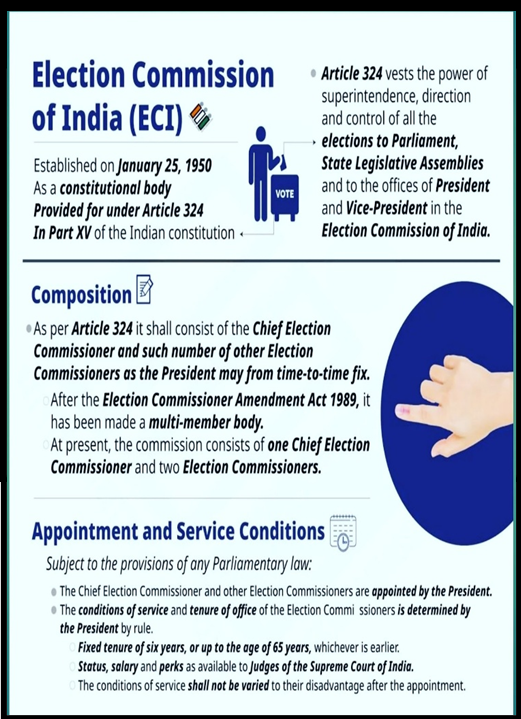RAJYA SABHA PASSES BILL ON APPOINTMENT OF CEC, ECS
Why in the News?
The Rajya Sabha approved the “Election Chief Commissioner and Other Election Commissioners (Appointment, Conditions of Service and Term of Office) Bill,” outlining procedures for appointing the Chief Election Commissioner (CEC) and Election Commissioners (ECs).
About Current Appointment Process of CEC and EC:
- Constitutional Framework:
- The Constitution lacks a specific legislative process for appointing the Chief Election Commissioner (CEC) and Election Commissioners (ECs).
- Articles 324-329 in Part XV (Elections) of the Constitution provide the foundational framework.
- Role of Article 324:
- Article 324 confers the “superintendence, direction, and control of elections” to an Election Commission.
- The Commission comprises the CEC and other ECs, the number of which is determined by the President.
- Pre-SC Ruling Procedure: Prior to the Supreme Court ruling in March 2023, the President appointed the CEC and ECs based on government recommendations.
Issue with the Previous Provision
The 1991 Act lacked provisions for appointing CEC and ECs, leading to government-driven decisions.
Highlights of the Bill:
- The Bill establishes a 3 Member search-and-selection committee consisting of the Prime Minister, Leader of the Opposition (or leader of the largest Opposition party in Lok Sabha), and a Cabinet Minister for future appointments, introducing transparency to the process.
- The selection process replaces the previous method of the President appointing the CEC and ECs based on government advice.
- The Bill introduced a protective clause shielding the CEC and ECs from legal proceedings for actions performed during their official duties.
- The Centre introduced amendments aligning CEC and ECs’ protocol, salaries, and emoluments with Supreme Court judges.
The passage of the Bill in the Rajya Sabha marks a significant step in restructuring the appointment procedures for key election positions, sparking debates on the government’s intentions and constitutional implications.




